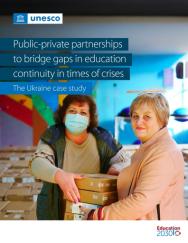News
中天广场(小西门中信银行大厦)
Over 3,400 educational institutions have been damaged, with more than 350 completely destroyed, according to the latest figures published by the Ministry of Education and Science of Ukraine (MESU).
As UNESCO’s Global Education Coalition marks its fifth anniversary, one of its key achievements in responding to this crisis has been the mobilization of its members to support the continuity of learning in Ukraine.
When the invasion of Ukraine by the Russian Federation broke out in February 2022, twenty-five members of the Coalition responded to a call for support from the Ministry of Education and Science of Ukraine (MESU). Much of the response was mobilized by the Coalition’s private sector partners, who leveraged their expertise and resources to complement the critical efforts led by multilateral and NGOs at the local level.
Digital support for education in Ukraine
KPMG was among the Coalition members who responded to the Ministry’s call to action, deploying two full-time staff secondments to support UNESCO's activities. These efforts included the delivery of devices and teacher training to support distance and hybrid learning.
In 2023, UNESCO, with support from Google and facilitation through the Global Partnership for Education's Multiplier innovative finance instrument, distributed over 50,000 devices to teachers across Ukraine and more than 8,500 devices to Ukrainian children unable to attend in-person education due to the ongoing war. Data collected by UNESCO from local educational facilities revealed that, during the 2022/23 academic year, each teacher, on average, engaged with 124 students through their device.
Additionally, UNESCO’s Digital Teacher training course, with funding from Google.org, continues to support teachers in Ukraine to develop digital skills and deliver quality distance and hybrid education. This self-paced training and suite of resources are designed to strengthen teachers' skills and ability to leverage digital tools. To date, nearly 77,400 teachers have enrolled in the course, representing more than 1 in 4 teachers in Ukraine.
This course was developed by UNESCO, including UNESCO’s Mahatma Gandhi Institute of Education for Peace and Sustainable Development (MGIEP), and Ukrainian experts and teachers. It boasts a 42% completion rate — ten times the national average for free training courses offered in Ukraine. The project’s community of practice, which has 31,000 subscribers, enables teachers to engage with peers, gain access to professional psychologists, and participate in live events.
Key learnings for sustainable collaborations
The collective efforts of the Coalition and its diverse partners have supported learning continuity during a challenging time in Ukraine. A new UNESCO report, produced in collaboration with KPMG International, further highlights some of these contributions. It demonstrates the importance ofpublic-private partnerships to bridge gaps in education continuity in times of crises.
The report identifies key factors that enhanced the collaboration and helped to ensure the longer-term sustainability of the projects. These factors prioritize clear, needs-driven outcomes centered on skills development and deepening local engagement, creating a foundation for more impactful and resilient initiatives addressing immediate challenges and future opportunities.


Supporting continuity of learning in Ukraine
Launched in 2020 to support education systems during the COVID-19 crisis, UNESCO’s Global Education Coalition now has over 230 members contributing diverse expertise and resources to advance progress for SDG 4 and support education systems in times of crisis.






